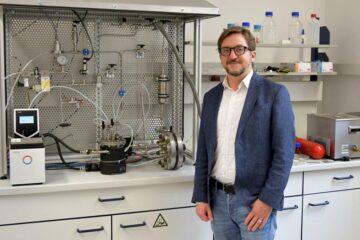Is old drug new treatment for glioma?

Brain tumours, such as those that affect glial cells, are among the most lethal of all cancers. Often, before a cure or treatment for a disease can be decided on, it is vital to understand the pathology underlying the disease. Now, scientists at New York Medical College, Valhalla, New York, USA, have identified a mechanism by which gliomas spread rapidly through brain tissue and, perhaps more importantly, drugs already exist that may be able to curb this spread.
As reported in September’s issue of Nature Medicine, Maiken Nedergaard and colleagues have discovered that glioma tumour cells release the neurotransmitter glutamate, which carves a path of destruction through brain tissue allowing the tumour cells to advance. Moreover, they found that well-known compounds, such as the NMDA (N-methyl D-asparatate) receptor antagonist MK801, are able to slow the growth of tumours implanted in the brains of adult rats.
In an accompanying News & Views article, Jeffrey Rothstein and Henry Brem of Johns Hopkins University Baltimore, Maryland, USA, discuss how these findings in rat might be extrapolated to humans with brain cancer.
Media Contact
Weitere Informationen:
http://www.nature.com/cancer/hotp/200109/9.htmlAlle Nachrichten aus der Kategorie: Medizin Gesundheit
Dieser Fachbereich fasst die Vielzahl der medizinischen Fachrichtungen aus dem Bereich der Humanmedizin zusammen.
Unter anderem finden Sie hier Berichte aus den Teilbereichen: Anästhesiologie, Anatomie, Chirurgie, Humangenetik, Hygiene und Umweltmedizin, Innere Medizin, Neurologie, Pharmakologie, Physiologie, Urologie oder Zahnmedizin.
Neueste Beiträge

Ideen für die Zukunft
TU Berlin präsentiert sich vom 22. bis 26. April 2024 mit neun Projekten auf der Hannover Messe 2024. Die HANNOVER MESSE gilt als die Weltleitmesse der Industrie. Ihr diesjähriger Schwerpunkt…

Peptide auf interstellarem Eis
Dass einfache Peptide auf kosmischen Staubkörnern entstehen können, wurde vom Forschungsteam um Dr. Serge Krasnokutski vom Astrophysikalischen Labor des Max-Planck-Instituts für Astronomie an der Universität Jena bereits gezeigt. Bisher ging…

Wasserstoff-Produktion in der heimischen Garage
Forschungsteam der Frankfurt UAS entwickelt Prototyp für Privathaushalte: Förderzusage vom Land Hessen für 2. Projektphase. Wasserstoff als Energieträger der Zukunft ist nicht frei verfügbar, sondern muss aufwendig hergestellt werden. Das…





















